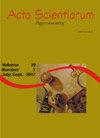Pyruvate supplementation in cotton under water restriction varying the phenological phases
IF 1.2
4区 农林科学
引用次数: 0
Abstract
Cotton is one of the largest agricultural commodities that generate various sources of foreign exchange and employment worldwide. However, water deficiency is an environmental factor that limits the production of this crop, especially in semi-arid regions. We evaluated pyruvate supplementation to mitigate the effects of water stress on colored cotton. Experiments were conducted in a greenhouse. We studied two forms of pyruvate supplementation (SP1- via seed and foliar and SP2- only via foliar); three conditions of irrigation management of the plants: water restriction in the vegetative phase (VE), flowering (FL), and vegetative and flowering (VE/FL); and additional treatment (total irrigation throughout the crop cycle and without pyruvate supplementation). The experimental design included a randomized block in a 2 × 3 + 1 factorial scheme. The factors resulted in seven treatments with three replications, with a total of 21 experimental units. Gas exchange, enzyme activity, and production of components were evaluated. Water restriction in the vegetative phase does not cause losses in BRS Jade cotton when supplemented with pyruvate. However, in the flowering and vegetative phases plus flowering, it reduces gas exchange and production components and increases the activity of antioxidant enzymes in relation to plants under full irrigation. Supplementation with pyruvate via seed plus foliar (SP1) was better for BRS Jade cotton grown under water restriction.限水条件下棉花丙酮酸补充对物候期的影响
棉花是最大的农产品之一,在世界范围内产生各种外汇和就业来源。然而,缺水是限制这种作物生产的一个环境因素,特别是在半干旱地区。我们评估了补充丙酮酸对减轻水分胁迫对彩棉的影响。实验是在温室里进行的。我们研究了两种形式的丙酮酸补充(SP1-通过种子和叶面,SP2-仅通过叶面);植物灌溉管理的三个条件:营养期限水(VE)、开花期限水(FL)和营养期限水(VE/FL);和额外的处理(整个作物周期的完全灌溉,不补充丙酮酸)。实验设计包括2 × 3 + 1因子方案的随机分组。这些因素导致了7个治疗,3个重复,总共21个实验单位。评估了气体交换、酶活性和组分的产生。在营养期限制水分,补充丙酮酸不会造成BRS玉棉的损失。但在开花和营养期加上开花期,与充分灌溉相比,减少了植物的气体交换和生产成分,提高了抗氧化酶的活性。限水条件下,通过籽粒+叶面(SP1)补施丙酮酸效果较好。
本文章由计算机程序翻译,如有差异,请以英文原文为准。
求助全文
约1分钟内获得全文
求助全文
来源期刊

Acta Scientiarum-agronomy
AGRONOMY-
CiteScore
2.30
自引率
0.00%
发文量
45
期刊介绍:
The journal publishes original articles in all areas of Agronomy, including soil sciences, agricultural entomology, soil fertility and manuring, soil physics, physiology of cultivated plants, phytopathology, phyto-health, phytotechny, genesis, morphology and soil classification, management and conservation of soil, integrated management of plant pests, vegetal improvement, agricultural microbiology, agricultural parasitology, production and processing of seeds.
 求助内容:
求助内容: 应助结果提醒方式:
应助结果提醒方式:


